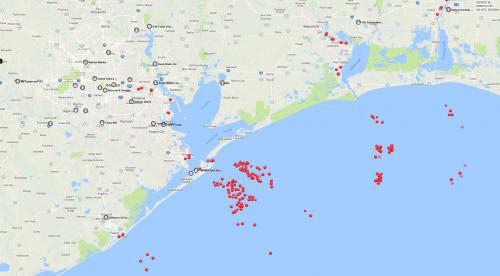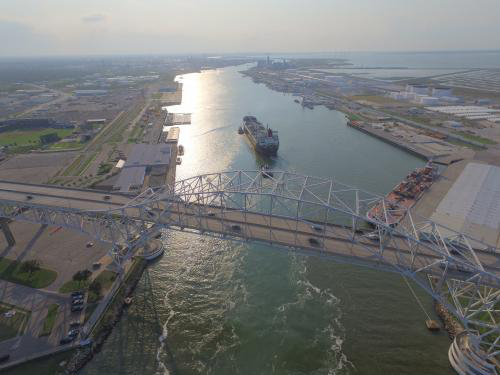Oil Tanker Logjam Grows To 54 Ships As Gulf Ports Remain Closed
Tyler Durden
 On Tuesday, just as Hurricane Harvey was peaking, we reported that according to ship-tracking data compiled by Bloomberg, as well as MarineTraffic real-time tracking, at least 25 tankers carrying almost 17 million barrels of imported crude oil were drifting near Texas and Louisiana ports, unable to offload because of closures from Tropical Storm Harvey. On Tuesday, just as Hurricane Harvey was peaking, we reported that according to ship-tracking data compiled by Bloomberg, as well as MarineTraffic real-time tracking, at least 25 tankers carrying almost 17 million barrels of imported crude oil were drifting near Texas and Louisiana ports, unable to offload because of closures from Tropical Storm Harvey.
Since then the situation has deteriorated by more than double, and as of Friday evening, Bloomberg reports that 54 tankers with capacity more than 33 million barrels either to deliver imported crude from Latin America, Europe, Caribbean, Africa and Middle East or receive U.S. supplies are drifting off U.S. Gulf Coast as several key ports remain closed while others are open with restrictions.
The historic "tanker traffic jam", last observed nearly two years ago as traders scrambled to store crude tankers in the same region in hopes of contango, can be seen on the Marine Traffic map below, only this time it has little to do with the shape of the oil strip, and everything to do with the logistical complications following Harvey :

Source: Marine Traffic
According to Bloomberg, as of Sept. 1, 37 Aframaxes, 3 VLCCs, 8 Suezmaxes, 6 Panamax tankers are currently waiting off ports of Corpus Christi, Houston, Galveston, Freeport, Texas City, Beaumont, Nederland, Port Arthur, Port Neches, Sabine and Lake Charles, La. This is 8 more then the 29 tankers carrying 18.6mm bbl as of Aug. 31.
That said, the situation is slowly but surely getting resolved as more ports are starting to let traffic sneak through. On Friday, the port of Corpus Christi reopened to ship traffic, making way for seven refineries in the area to go back online. The Texas Gulf Coast supplies one-fourth of the nation’s oil and gas. Hurricane Harvey caused a severe hiccup in the gasoline supply chain over the last week, creating consumer panic and long lines at gas stations.

The first vessel to arrive since closure of the channel for Hurricane Harvey sails
under the Harbor Bridge in Corpus Christi on Friday, Sept. 1
The port received its first tanker on Friday, Sept. 1, six days after closing in preparation for the storm, which came to shore as a Category 4 hurricane on Aug. 25. Some 20 vessels have been awaiting berth assignments and will now be able to enter Corpus Christi Channel.
Opening the port positioned Corpus Christi as the largest refining center fully operational on the Texas coast at this time. Nearly 100 percent of the electric power has been restored to the city’s refineries, while similar operations in Houston and Texas are tackling major flooding.
The nation’s economy depends on the port’s continued operation. More than 80,000 jobs depend on the Corpus Christi Ship Channel, where more than $100 million worth of goods pass through every day. Port of Corpus Christi stakeholders generate $350 million a day in national economic output
Here are some additional GOM port updates courtesy of Bloomberg:
- Kinder Morgan, Colonial will commingle gasoline grades on products lines
- Magellan is said to plan limited restart for Longhorn, BridgeTex
- Houston port partial reopening is said to still affect tankers
- U.S. Coast Guard says Port Corpus Christi to allow larger ships
- Four Aframax tankers enter port of Corpus Christi after storm
- Texas City refinery to resume exports as tankers arrive

our mission:
to widen the scope of financial, economic and political information available to the professional investing public.
to skeptically examine and, where necessary, attack the flaccid institution that financial journalism has become.
to liberate oppressed knowledge.
to provide analysis uninhibited by political constraint.
to facilitate information's unending quest for freedom.
our method: pseudonymous speech...
Anonymity is a shield from the tyranny of the majority. it thus exemplifies the purpose behind the bill of rights, and of the first amendment in particular: to protect unpopular individuals from retaliation-- and their ideas from suppression-- at the hand of an intolerant society.
...responsibly used.
The right to remain anonymous may be abused when it shields fraudulent conduct. but political speech by its nature will sometimes have unpalatable consequences, and, in general, our society accords greater weight to the value of free speech than to the dangers of its misuse.
Though often maligned (typically by those frustrated by an inability to engage in ad hominem attacks) anonymous speech has a long and storied history in the united states. used by the likes of mark twain (aka samuel langhorne clemens) to criticize common ignorance, and perhaps most famously by alexander hamilton, james madison and john jay (aka publius) to write the federalist papers, we think ourselves in good company in using one or another nom de plume. particularly in light of an emerging trend against vocalizing public dissent in the united states, we believe in the critical importance of anonymity and its role in dissident speech. like the economist magazine, we also believe that keeping authorship anonymous moves the focus of discussion to the content of speech and away from the speaker- as it should be. we believe not only that you should be comfortable with anonymous speech in such an environment, but that you should be suspicious of any speech that isn't.
www.zerohedge.com
|




